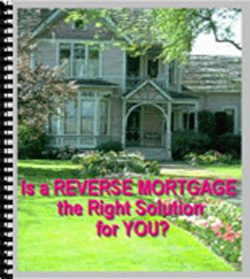
 License Type: Private Label Rights
License Type: Private Label Rights  File Type: ZIP
File Type: ZIP
 SKU: 60854
SKU: 60854  Shipping: Online Download
Shipping: Online Download
Sample Content Preview
Is a Reverse Mortgage
The Right Solution for You?
What Is A Reverse Mortgage?
A reverse mortgage is a mortgage that is geared to the elderly homeowners out there. This type of mortgage will allow them to use some or all of the equity that they have built up into their home over the years. Those that need funds to pay for medical bills, for long term care or to make improvements on their home can usually use the equity in their home to make these improvements. These loans are somewhat different than the conventional mortgage though.
To qualify for the reverse mortgage, you need to be at least 62 years of age. There are no credit or employment verifications. Some homes, such as those that are mobile homes, do not necessarily qualify for this type of loan because they may not be worth as much. The mortgage is taken out on the equity of the home. Equity is a term that describes the value of the home minus any mortgages or liens that are being held against it. The equity of a home goes up as the mortgage of the home is paid down. When the home is completely paid off, the equity of the home is the same as the home’s value on the market.
This type of mortgage is a bit different though. Generally, you will not need to repay the loan. In 95% of the cases, these loans will not be repaid. The mortgage becomes due when the homeowner dies or moves out of his home. At that point, he or she will have up to a year to repay the reverse mortgage or the home will be sold to pay off the mortgage loan. In most cases, the heirs of the property will be the ones to make that decision.
In the last several years, the numbers of reverse mortgage applications has grown significantly. This is due to the lack of funds that are needed to fund living expenses. Social security and pensions just do not seem to be enough for most. Therefore, the reverse mortgage can help them to make ends meet or do the things that they would like to do without worry of the cost.
It is important to consider this type of mortgage carefully, though. Like any other mortgage, you are taking out an amount of money on your home’s value. It is often a costly thing to do simply because of the fees involved. But, for many, there is no reason not to consider a reverse mortgage.
Is A Reverse Mortgage for You?
Those that are considering the reverse mortgage have to make a very important decision. Most of the time, those that are considering them are doing so because they need the funds for some main purpose. For example, they may not be brining in enough from social security, pensions or savings to maintain their living expenses. They may have a large purchase that is necessary such as a new vehicle. Or, they may need the funds for home improvements.
Some individuals use the funds that they get from a reverse mortgage to fund a second home or a recreational vehicle. If the funds are needed, those that have ownership or at least equity in their home, have the ability to secure this virtually free type of mortgage.
To qualify for a reverse mortgage, you have to be at least 62 years old. The older that you are, the more money you can get in your home mortgage on a monthly basis. Or, you may want to have the reverse mortgage funded to you in a lump sum. In any case, the reverse mortgage can happen rather quickly and can help you to secure the finances that you need.
To qualify for a reverse mortgage, you need to have at least some equity in your home. It is the equity that you have that you will be cashing out and using for funding. Equity is the amount of money that the home is worth minus any mortgages or liens that may be on it. The higher the equity is, the more of the home that you own. When you pay off your mortgage totally, the equity and the value of the home is the same. Those that are looking to use a reverse mortgage need to have at least some equity to cash in. This is where the funds come from.
If you still owe money on your home, the equity that you cash out in a reverse mortgage may need to go to pay down the rest of what is owed on the mortgage. The rest will be yours to use as you please. Unlike other loans, you can use the funds for anything that you see fit, once the mortgage on the home is paid for.
The reverse mortgage can be an ideal choice for those people that are in need of funding but do not have the money any other way. Since the funds for a reverse mortgage are not due to be paid back, in most cases, until the borrower dies or moves out of the home, the homeowner actually has access to money in the value of their home. Additionally, should the value of the home go up from the time that the reverse mortgage is taken, a second or even third reverse mortgage may be taken out.
What Are The Requirements For A Reverse Mortgage?
Have you heard of reverse mortgages? If you have, then you already know that there are plenty of benefits to them. Those that find themselves in need of funding for home improvements or medical help can often use a reverse mortgage to secure the funds that they need. This is an opportunity for many of them to get what they need without really having to pay for it. There are fees involved in the reverse mortgage that can reduce the amount that is paid to the homeowner, but in most cases, this is a small amount compared to the need that is out there.
To be eligible for a reverse mortgage, you will need to be at least 62 years of age. A single homeowner can apply or a couple can. In most cases, there are no requirements for employment and no credit checks are done on those that are taking out the mortgage. Most of those that have equity in their home will be able to secure the reverse mortgage based on home ownership itself.
If you still owe money on the home through a lien or mortgage, you will need to use the reverse mortgage to pay this amount off. This is a standard agreement so that the lender providing the reverse mortgage will be the one that holds the entire mortgage on the home. If the amount of the reverse mortgage is not enough to pay down the mortgage that is being held on the home, then personal savings must be used to pay it down.
If the homeowners are in the process of filing bankruptcy, the process of getting a reverse mortgage may be delayed until the bankruptcy is filed and settled. This is to insure that the home is not part of the bankruptcy and that the providers of the reverse mortgage will still hold the title to the home.
Most homes are able to qualify for a reverse mortgage. In some cases, though, it may not be a consideration. For example, most mobile homes do not qualify for a reverse mortgage.
In some areas, your state or local government may actually help to fund the reverse mortgage. This can give an additional option to those that need it. Also, most of the reverse mortgages that are taken out are also backed by FHA. This means that if the proceeds from the sale of the home (when the homeowner dies or moves out) are not enough to cover the cost of the reverse mortgage, FHA will refund the rest of the money.
- License: Private Label Rights
- Category:Ebooks
- Tags:2010 Ebooks Private Label Rights







